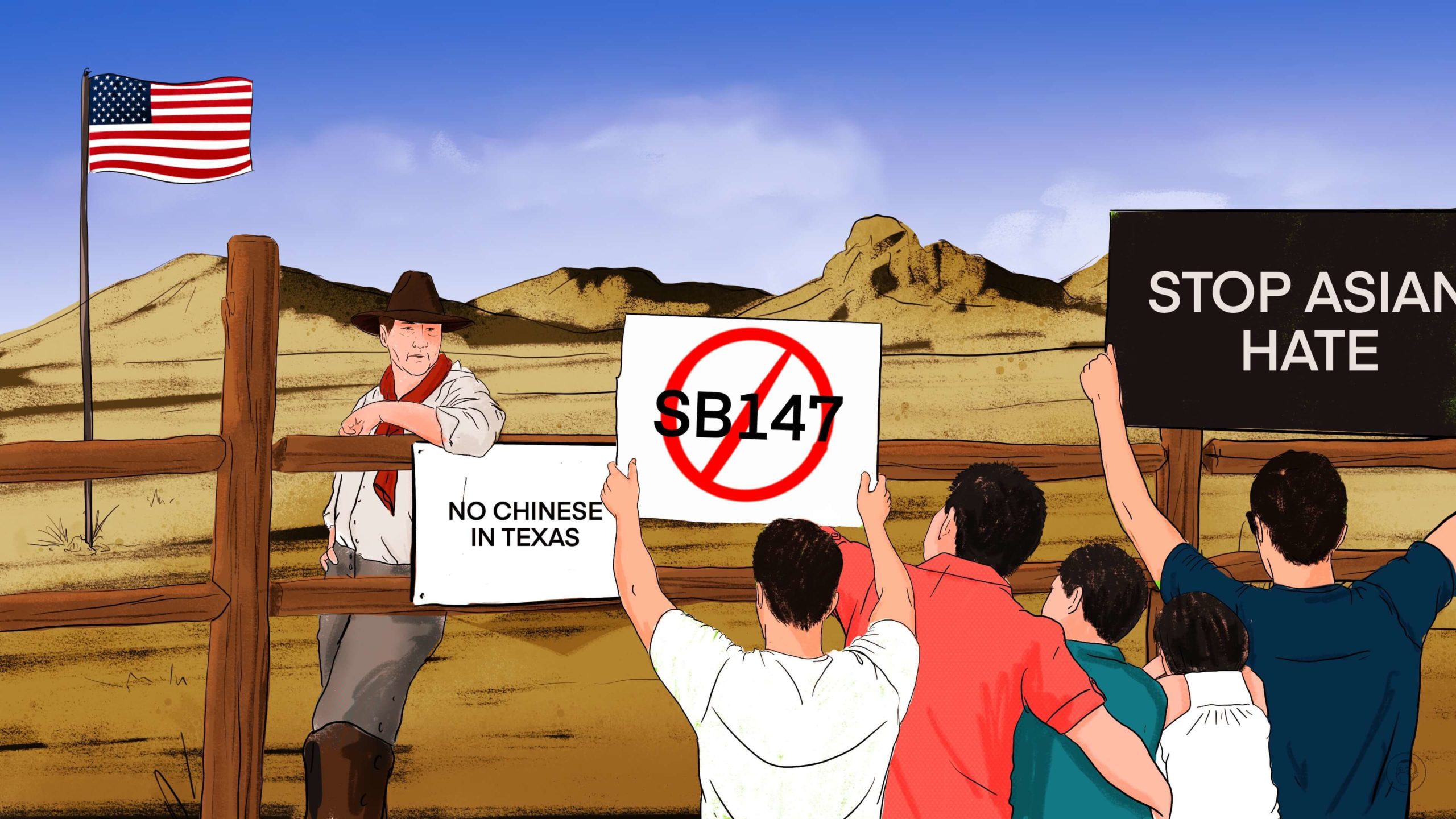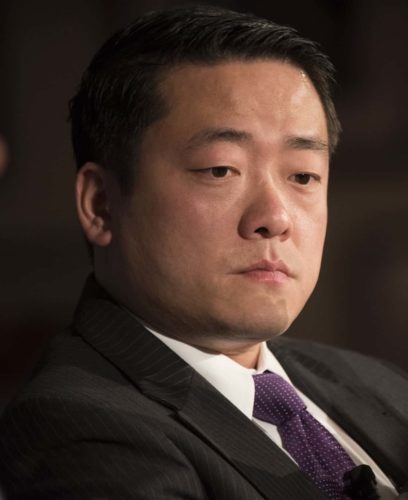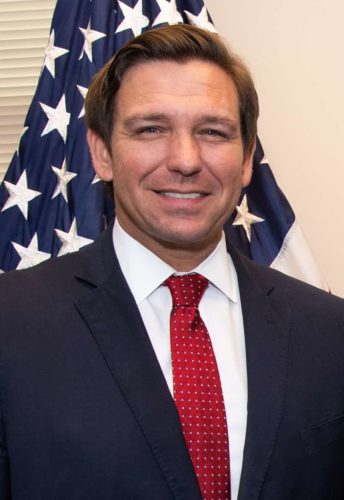Texas wants to repeat history with a bill to ban Chinese immigrants from owning property
As concerns about China spying on the United States intensify, state officials are touting their anti-Communist credentials with carelessly-written draft legislation. Ordinary Chinese immigrants will take the hit.

On May 3, 1913, California passed the “Alien Land Law,” which banned Asian immigrants from owning land. The law targeted Chinese, Indian, Japanese, and Korean immigrant farmers in California, in response to growing anti-Asian sentiment across the United States. Arizona, Washington, Texas, Louisiana, New Mexico, Idaho, Montana, and Oregon passed similar laws between 1913 and 1925, followed by Arkansas, Minnesota, Nebraska, Utah, and Wyoming during World War II.
Some states, like Florida, put amendments into their constitutions. There was no need to specifically “ban” Asian immigrants from buying land, when Florida put in place their “alien land law” the right to become a naturalized citizen in the state extended only to free white people and people of African descent. They only needed to add a sentence in the constitution prohibiting the right to “real property by aliens ineligible for citizenship.”
These policies were based on prejudice, economic anxiety, and the belief that Asian immigrants were unable to assimilate into white society. Coming after the Chinese Exclusion Act of 1882, the laws were devastating for Asian people hoping to find a home in the United States.
It seems the U.S. has not learned from history.
The land laws prohibiting Asian immigrants from owning land in the early 1900s were meant to address “concerns” about job security for white laborers. Now, states like Texas are once again seeking to prevent certain immigrants from owning land, this time under the guise of “national security.”

Texas Senate Bill 147 has brought out hundreds of protesters to the streets in front of the Texas Capitol in Austin. The bill, filed by Senator Lois Kolkhorst (R), aims to ban citizens, governments and entities from China, Iran, North Korea, and Russia from purchasing land in the state. Governor Greg Abbott has already said that he would sign the bill if it reaches his desk.
“The time to address adversarial countries acquiring land is before it becomes widespread, not after they already control substantial amounts of Texas,” Senator Kolkhorst said earlier this week. According to her, the bill was prompted by concerns over “growing ownership” of land by foreign entities.
A wind farm in Texas
These concerns stem from a variety of cases. In Texas specifically, since 2016, a company owned by Xinjiang-based real estate tycoon and former People’s Liberation Army captain Sūn Guǎngxìn 孙广信 has spent an estimated $110 million buying up land in Val Verde County. He aimed to build a wind farm that could feed into Texas’ electricity grid. Conservationists pushed against the project as it threatened the preservation of public and private lands surrounding Devils River, often referred to as “the most pristine river in Texas.”
But the debate around the development shifted during the 2020 presidential election. On July 10, 2020 Texas Republican senators John Cornyn and Ted Cruz and Representative Will Hurd sent a letter to then U.S. Treasury Secretary Steven Mnuchin. They felt that Sun Guangxin’s wind farm plans posed a national security threat because the land he purchased happened to be near Laughlin Air Force Base, a training ground for military pilots.
The area is part of U.S. District 23, a significant region between San Antonio and El Paso. In the 2020 elections, Republicans and Democrats hotly contested the seat. They debated health care, the pandemic…and the future of Sun’s Blue Hills Wind Farm. Politicians took to the airwaves, expressing concerns that Sun Guangxin had significant connections to the Chinese Communist Party, who would be able to use Sun’s wind farms to gather intelligence on U.S. border security operations and on Laughlin Air Force Base.
Despite all the controversies, in 2021 the Department of Defense granted Sun’s company a mitigation agreement, and the Committee on Foreign Investment in the United States (CFIUS), a group that reviews national security implications of foreign investments, signed off on the purchases just one year prior.
Nonetheless, the Texas Legislature passed a law, the Lone Star Infrastructure Act, which prevented Texas businesses and government officials from making infrastructure agreements with China, Russia, Iran and North Korea.
A corn mill in North Dakota
It’s not just Texas where security concerns are causing officials to block or hinder land sales.
In 2021, a privately owned Chinese company Fufeng Group sought to purchase 300 acres for a corn milling plant in the city of Grand Forks, North Dakota. Land which happened to be just 20 minutes from an Air Force Base in the area. That project is now headed for cancellation after the U.S. Air Force and local officials voiced national security concerns.
Much like the case with Blue Hills Wind Farm, Fufeng Group’s development wasn’t controversial until right around election season. When Grand Forks landed the project, which would have been the city’s largest economic development project in recent history, even North Dakota’s Republican governor, Doug Burgum celebrated.
“Adding value to our corn and other raw commodities is critical to North Dakota’s long-term economic success, and this value-added project represents a huge opportunity for producers and workers in the Grand Forks area and our entire state.” Burgum said when the project was initially announced.
There was opposition from citizens however, who were concerned about property rights and water use. Some even raised their voices about the China connection. The city’s mayor Brandon Bochenski, who at the time was serving his first term, pushed back initially. In an interview in 2021 he asked “Are we going to be the first one to basically say no to globalism?”
But in 2022, the tone shifted drastically and now Bochenski and Burgum are united in shutting the project down. This has been a slow process since CFIUS determined the land deal does not fall under its jurisdiction. “The response from the federal government during this process can only be viewed as slow and contradictory,” Bochenski said, adding that “this directive leaves open the question of other entities with Chinese connections across the nation.” Bochenski added on to his ‘concerns’ about Chinese connections by pointing to “Chinese students and professors at the University of North Dakota.”
From economic partner to perceived threat
To many in the U.S. today, China has become less of an attractive economic partner and more of a threat. The responses to the previously mentioned developments and Kolkhorst’s bill in Texas reflect this changing sentiment.
But for all the talk about national security and threats of spying, the language used by politicians may put innocent immigrants at risk.
Kolkhorst claims to be taking a stand against Chinese security threats, as expressed in a statement she gave on the bill on January 20th.
“As I have traveled across my senate district, one of the top concerns for many Texans is national security and the growing ownership of Texas land by certain adversarial foreign entities, such as the 130,000 acres near Laughlin Air Force Base in Del Rio that was recently purchased by a former officer of the Chinese army. Many Texans find this trend highly disturbing and a major red flag.”

But Kolkhorst’s Bill 147 doesn’t actually specify the banning of foreign land purchases near military bases, which is an understandable security concern. According to TexasRepresentative Gene Wu (D) who has been one of the most vocal critics of the bill, that concern was already addressed in the Lone Star Infrastructure Act which prohibits contracts with certain foreign-owned companies in connection with critical infrastructure in Texas. “This bill,” Wu said in an interview with The China Project, “says all land. Not just critical infrastructure. Not just land near military installations, but all land.”
Does Texas not trust Asian immigrants?
According to the bill’s current wording, a Chinese immigrant wouldn’t even be able to purchase a townhouse in the middle of nowhere, let alone in Houston, Austin, or Dallas — something that could violate the Fair Housing Act of 1968 which prohibits discrimination concerning the sale, rental, and financing of housing based on race, religion, national origin, sex, handicap and family status.
When confronted about concerns citizens had about the wording of the policy, Texas governor Greg Abbot said during an event at the Capitol on January 25, “Obviously, none of us know what the final language will look like. I do think that would be a mischaracterization of what the bill seeks to do. We have a goal here, and that’s to prevent countries that are hostile to the interest of the United States from being able to buy up our farmland or other land that’s so important to us.”
Kolkhorst has said in her January statement that the bill “will make crystal clear that the prohibitions do not apply to United States citizens and lawful permanent residents.” But that clarification has yet to be written in ink, and many wonder why such wording was chosen in the first place, when it could prevent legal residents from purchasing a home.
“What’s especially insulting and painful for the Asian community, for the Chinese community, is the fact that we have already done this,” Representative Gene Wu said, pointing to a number of past policies that prevented Asian immigrants from buying land. “Here we are in 2023 and while the rationale is different, the underlying message is the same; we have to prevent Chinese immigrants from purchasing land because they cannot be trusted.”
Job Hammond, the President of the Asian Real Estate Association of America’s Austin branch told The China Project: “Any sort of bill like this can lead to anti-Asian sentiment. I think if this bill passes, it is just the beginning of an exclusionary type approach for people of other national origins. None of the wording is appropriate.”
For Hammond, the bill hits especially close to home: His mother was a Chinese immigrant who came to the United States in search of the American Dream, and according to Mr. Hammond, Senate Bill 147 has the ability to take that opportunity from many. “These are folks that are just trying to make purchases here in Texas, just trying to live a normal life. They are just like you and me.”
Everything’s bigger in Texas, but not Asian property ownership
With the way Kolkhorst, Abbot and other politicians speak about Chinese land purchases one would think it is a common occurrence, but the hungriest land purchaser is actually Canada.
Of the 900 million acres that makes up the United State’s farmland, 3.1%, or around 40.8 million acres — roughly the size of Iowa and mostly in Texas, Maine, and Alabama — is owned by entities from more than 100 foreign countries, with Canadians being the most significant, owning 12.8 million acres. Only little over 1% of foreign-owned farmland in the U.S., or about 197,000 acres, is owned by Chinese entities, a number which has remained largely unchanged since 2013.
While many are protesting the bill due to its apparent anti-Asian prejudice, it is also important to note the level of devastation the legislation could bring to Texas’ own industries. China accounts for more than 5% of Texas exports, according to data from 2018. In 2021, Texas exported goods with a total value of about $20.6 billion to China,and according to Rep. Gene Wu, the country “is the third largest importer of Texas goods. Texas oil, Texas wheat, Texas corn, Texas soybeans — [the bill could] really, really damage farmers. Because if we pass this legislation, we could lose all these trade deals.”
Will other states follow suit?
Already other states are starting to follow in Texas’ footsteps. Florida Governor Ron DeSantis has expressed a desire to introduce a similar law.

In a press conference on January 10, DeSantis said “If you look at the Chinese Communist Party, they’ve been very active throughout the Western Hemisphere in gobbling up land, that is not in the best interests of Florida to have the Chinese Communist Party owning farmland, owning land close to military bases.”
DeSantis did not make a clear distinction between people who were born in China and the Chinese Communist Party.
This is especially alarming for Florida, the last state in the country to repeal its Alien Land Law. That only happened in 2018, despite the Supreme Court striking alien land laws down in 1952. Florida buried its alien land law in a 1926 amendment within a provision to the “Basic Rights” paragraph of the Florida Constitution (Article 1, Section 2) that made it so “the ownership, inheritance, disposition and possession of real property by aliens ineligible to citizenship may be regulated or prohibited by law.” The amendment was specifically aimed at keeping Japanese farmers from leasing or owning land.
The timing of these exclusionary policies is no coincidence, as many politicians like DeSantis are gearing up for the 2024 election. “This is something that happens every generation or so. There is a need to find a bogeyman, there’s a need to find a scapegoat within our society to blame and to target,” said Representative Wu.
“Politicians have spent time to gin up hate and gin up fear on certain communities and later on they have to feed this fear, this animal, this beast they have created.” It seems like fears of China, no matter how irrational, will once again be part of some politicians’ emotive calls for votes and funding, with no regard to the harm such rhetoric will do to regular people with no connection to the increasing tensions between China and the United States.






